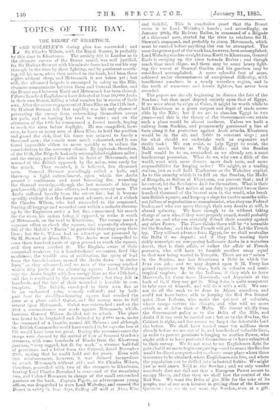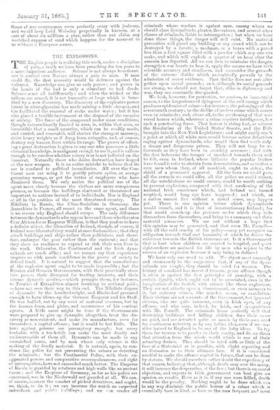TOPICS OF THE DAY.
THE RELIEF OF KHARTOUM.
TORD WOLSELEY'S daring plan has succeeded ; and Sir Charles Wilson, with the Royal Sussex, is probably by this time in Khartoum. The anxiety felt in London as to the ultimate success of the Desert march was well justified, for Sir Herbert Stewart with his minute force had to cut his way through to the river by sheer fighting, and by persistent marching, till his men, when they arrived on the bank, had been three nights without sleep, and Metemmeh is not taken yet ; but still, the advanced brigade is encamped in safety on the Nile, steamers communicate between them and General Gordon, and the Desert road between Korti and Meteutmeh has been cleared. Fifteen hundred Englishmen have defeated at least 10,000 Arabs in their own Desert, killing a total number far in excess of their own. After the severe engagement at Abou Klett on the 17th inst., Sir Herbert Stewart felt that rapidity was his only chance of preventing the enemy from entrenching themselves across his path, and so barring his road to water ; and on the afternoon of the 18th he commenced a forced march, hoping to reach the river before daylight. He was compelled, however, to leave so many men at Abou Klett, to hold the position and guard the sick, that his force was reduced to barely a thousand men ; the camels were much exhausted, and it was found impossible either to move quickly or to reduce the camel-drivers to the necessary silence. By daybreak, therefore, of the 19th, the Brigade had only accomplished eighteen miles ; and the enemy, posted five miles in front of Metemmeb, and warned of the British approach by the noise, were ready for
the attack. They counted, it is believed, five thousand men. General Stewart accordingly called a halt, and
threw-up a light entrenchment, upon which the Arabs poured a continuous and most harassing fire, wounding the General severely,—though the last accounts of him are good,—with eight or nine officers, and some seventy men. The Arabs suffered heavily front the retern fire ; but it became speedily evident that the force must advance, and at 2 o'clock Sir Charles Wilson, who had succeeded to the command, leaving all baggage and wounded men within a redoubt thrownup by the Engineers under a hot fire, commenced his march for the river, his orders being, if opposed, to strike it south of Metemmeh, on the road to Khartoum. The enemy made a supreme effort to cheek the square, and repeatedly charged, five of the Malnlis " Emirs" in particular throwing away their lives ; but Sir C. Wilson had an advantage not possessed by Sir IL Stewart at Abou Klee. The Arabs were compelled to cross three hundred yards of open ground to reach the square, and they never reached it. The Englieh, aware of their numerical weakness for a hand-to-hand encounter, fired like machines; the terrible arm of civilisation. the spray of lead front the breech-loaders, mowed the Arabs down .• in entire lines" as they advanced, and no man of the enemy reached within fifty yards of the ad vanc:ng square. Lord Wolseley say the Arabs fought with lees energy than on the 17th inst., and this is cendrmed by the correspondents ; but they fell in hundreds. and the fate of their wounded is horrible to con
template. The Di itish, enveleped in their own fire as in an enchanted robe, searcely suffered ; and by halfpast four the steedily-advancing square had reached the river at a place called 0 uhat, end the enemy were in full retreat upon Metemmeh. Guled was entrenched ; and on the 21st a reconnaisance was made against Metentraeh, which, however. General Wilson decided not to attack. The place was found to be loopholed and defended by 2,000 men, under the command of a fanatic, named Ali Mousse; and although the British Commander could have carried it, he says the loss of life would have Leen too great. During the reconnaissance the troops were cheered by the arrival of four of General Gordon's steamers, with some hundreds of Blacks from the Khartoum garr:son, " very ragged, but fit for work," a steamer half-full of provisions, and a letter from the General, dated December 29th, stating that he could hold out for years. Even with this reinforcement, however, it was deemed inexpedient to attack Metemmeh without aid ; and Sir Charles Wilson, therefore, proceeded with two of the steamers to Khartoum, leaving Lord Chalks Deresford in command of the remaining two, and Colonel Boseawen in charge of the small entrenched garrison on the bank. Captain Pigott, an adventurous young officer, was despatched to warn Lord Wolseley, and crossed the Desert in safety in four any, findingall well at Abou Klee
and Gakdul. This is conclusive proof that the Desert route is in Lord Wolseley's hands ; and accordingly, on January 28th, Sir Redvers Buller, in command of a Brigade of a thousand men, started for the river to reinforce Sir H. Stewart's command, and probably to storm Metemmeh, which I must be carried before anything else can be attempted. The most dangerous part of the work has, however, been accomplished. Lord Wolseley reaches straight from Korti to Khartoum, General Earle is creeping up the river towards Berber ; and though much time must elapse, and there may be some heavy fighting, the rescue of General Gordon and his garrison may be considered accomplished. A more splendid feat of arms, achieved under circumstances of exceptional difficulty, with insufficient numbers, in a nearly waterles region, and in the teeth of numerous, and heroic fighters, has never been recorded.
The papers are already beginning to discuss the fate of the Soudan ; but that must depend entirely upon that of Egypt. If we were about to reign at Cairo, it might be worth while tohold Khartoum as a great outpost and depot of trade accessible by the Nile ; but if we are to abandon Egypt in two years—and this is the theory of the Government—to retain such a place would be almost madness. Unless we built a railway from Suakim, and permanently garrisoned a line of forts along it for protection against Arab attacks, Khartoum would be in the air, and liable to constant siege ; and for what should we undertake such an expensive and sterile task ? We can resist, or help Egypt to resist, the 11.1ahdi much better at Wady Haifa ; and the Soudan itself would be to us, overtatsked as we already are, a most burdensome possession. What do we, who own a fifth of the world, want with more deserts, more dark men, and more responsibilities for keeping order ? We might, as a trading station, just as well hold Tirebuctoo or the Wahabee capital. As to the anarchy which is to fall on the Soudan, the Mudir of Dongola, as Sultan of Khartoum, can prevent that ; and if he cannot, let the Sondanese do it for themselves. What is their anarchy to us ? That notion of our duty to protect two or three hundred thousand of the bravest men in the world, who break into British squares, and keep-up a siege for twelve months without failure of organisation or commissariat, who obey one Federal leader, and who can move through their own deserts at will,. is absurd quixotry. We have enough to do without taking charge of men who, if they were properly armed, would probably defeat us, and who can certainly defend their country against any other Power. The Times thinks there will be "a scramble for the Soudan," and that the French will get it. Let the French try. They will not advance front Egypt., for we shall neutralise the Delta if we depart ; and if they like wasting their sickly conscripts on conquering half-caste Arabs in a waterless desert, that is their affair, or rather the affair of French peasants, who will hare to furnish another army equal to that now being wasted in Tonquin. There are no " mines ". in the Soudan, nor has Khartoum a Debt in which the Jews can job ; and we may depend upon it M. Ferry has gained experience by this time, both in colonies and semitropical empires. As to the Italians, if they wish to have Massowah, let them have Maseowala. and Abyssinia at the back of it, if they can get it. King John is quite competent to take care of himself, and will do it with a will. We cannot do all the work to be done in Africa ourselves, and could not have better aids in jkeeping the Red Sea littoral quiet than Italians, who make the quietest of colonists, whose troops survive the elintate, and who will no more attack us at Aden than at Malta. We dissent wholly from the Government policy ae to the Delta of the Nile, and doubt if it. can ever be carried out ; but as to the Ssulan, the Cabinet is right, and the sooner we forget the detestable land the better. We shall have wasted some ten millions there already before we are out of it, and hundreds of valuable lives, in order to protect. garrisons bslongiug to another Power, who ought either to have protected themselves or to have submitted to their enemy. We do not want to see Englishmen fight for gain ; but if we are to begin conquering—and to annex the Soudan would be direct conquest—let us choose some place where there is revenue to be obtained, where Englishmen can live, and where the population can be drilled into industrial habits. We might just as well annex Nejd as the Soudan ; and we only wonder somebody does not find out that a European Power means to occupy Mecca, and that then we shall lose the control of the Red Sea. We want the Delta of the Nile for the sake of its people, and of our own interest in getting clear of the Eastern Question ; ism, we do not want the Soudan, even at a gift.
Some of our countrymen seem perfectly crazy with jealousy, and would keep Lord Wolseley perpetually in harness, at a cost of about six millions a year, rather than not claim any wretched expanse of sand which happens for the moment to be without a Enropean owner.



































 Previous page
Previous page